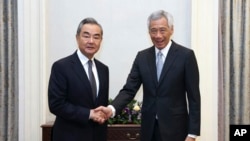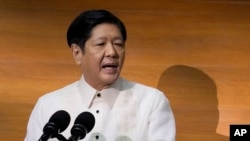Chinese Foreign Minister Wang Yi ended a whistle-stop tour of Singapore, Malaysia and Cambodia Sunday as tensions in the hotly disputed South China Sea continued to rise ahead of the Sept. 5-7 ASEAN leaders' summit in Jakarta.
His four-day trip was designed "to strengthen strategic communication with the three," according to a Chinese statement ahead of the tour, however, analysts said Wang was also keen to accelerate Beijing’s version of a Code of Conduct for the disputed international sea lanes and had focused on "friendly countries" in ASEAN.
Hunter Marston, a Southeast Asian academic with Australia National University, said shoring-up Chinese goodwill with more pliable partners in the 10-country ASEAN bloc was key, while at the same time isolating Western-leaning countries like the Philippines and Vietnam.
Philippine President Ferdinand Marcos Jr. has moved his country closer to the U.S. and taken a much harder line against Chinese maritime expansionism since his election last year.
Talks between Manila and Hanoi have also begun for a maritime pact to defend their mutual interests amid confrontations with Chinese vessels in recent weeks, which Marcos says "will bring an element of stability to the problems that we are seeing now in the South China Sea."
Marston said Wang had to reassert Chinese foreign policy concerning its interests, which meant offering more than simply ignoring a 2016 ruling by an international court in The Hague, which found in favor of the Philippines and rejected Chinese claims in the South China Sea.
"In some way he's probably making the Philippines feel a little bit out there on its own. In some ways the trips to Malaysia and Singapore are a lot more comfortable places for China to visit in light of Marcos Jr.'s overtures to Washington," he said.
Beijing's relations with ASEAN have been tested by its self-proclaimed control of most of the South China Sea through its nine-dash line, an assertion made despite overlapping claims from half of the bloc's members; Indonesia, Vietnam, the Philippines, Malaysia and Brunei.
Perhaps adding to Chinese anxiety is U.S. President Joe Biden, who announced on Tuesday that he would visit Vietnam "shortly" and two days later told a campaign reception in Salt Lake City that the Quad alliance – consisting of the U.S., Japan, India and Australia – was proving effective.
He said the U.S. was now in a position where "the Philippines and, soon, Vietnam and Cambodia" would want to be part of a U.S. relationship. "They don’t want to have a defense alliance, but they want relationships because they want China to know that they’re not alone."
Gavin Greenwood, an analyst with Hong Kong-based A2 Global said China’s motives rest on a combination of reassurance to an overt ally, Cambodia; greater clarity on future foreign and defense policies with Singapore, and improved relations with Malaysia ahead of the leaders' summit.
He also said Wang had chosen his countries carefully before embarking on the tour.
Code of Conduct questioned
"Further, Wang’s short Southeast Asia tour omits other key ASEAN members where there are seriously contentious issues – notably the Philippines and Vietnam – and those where there is not – Indonesia, Thailand, Laos and Myanmar."
Beijing's commitment to the planned Code of Conduct has also been questioned and blamed for its many delays, with diplomats saying China enjoys a position of strength through bilateral negotiations with individual ASEAN states as opposed to finding a consensus through the agreement with the 10 nations as a bloc.
That was evident last week during a confrontation between Chinese and Philippine vessels at Second Thomas Shoal in the Spratly Islands, where Manila maintains a scuttled naval vessel as an occupied base that Beijing wants removed.
After Wang visited Singapore and Malaysia, the official Chinese state news agency, Xinhua, reported Wang had noted that China had repeatedly expressed its willingness to resolve differences with the Philippines through bilateral dialogue.
It also said Wang hoped that the Philippine side would abide by the consensus reached in the past, and he stressed that China is willing to work with ASEAN countries to accelerate consultations on the Code of Conduct in line with international law.
"The Chinese are clearly trying to put on a nice face by sending Wang around on a diplomatic tour in light of the blatant maritime harassment they have directed against the Philippines and Vietnam in recent weeks," Marston said.
"It's also in Beijing's interests to send Wang, given his recent reappointment as foreign minister, to signal continuity and stability in China's foreign policy," he added.
"I think some of it is directly aimed at The Philippines, especially in light of the latest blatant coercion and intimidation tactics."
Meeting in Cambodia
However, Biden's references to Cambodia – China's closest regional ally – were met with disbelief among bureaucrats in Phnom Penh who enjoy a cozy relationship with Beijing and will shortly open a Chinese-funded reconstruction of the Ream Naval Base on the south coast.
"China wants to accelerate the Code of Conduct, which was already happening just before the COVID-19 pandemic erupted and Beijing wants that back on track. In its current form it’s the type of thing that will really annoy the Americans," said a source close to the Cambodian government.
In Cambodia, Wang lunched with Prime Minister Hun Sen – who has often been accused of acting as China’s proxy within ASEAN – and met with his son, Hun Manet, who will replace his father as prime minister on Aug. 22.
After Wang’s visit, the Chinese embassy in Phnom Penh said China “will, as always, stand with Cambodia, and firmly support Cambodia in following a development path suited to its national conditions, safeguarding national interests and dignity, and playing a bigger role on international and regional occasions.”
Marston said, "The timing of the visit to Cambodia is well placed in light of recent elections, cementing Beijing's partnership with Phnom Penh but I wouldn't expect Phnom Penh to depart from Hun Sen's foreign policy of non-alignment/soft tilt toward China."
However, the biggest issue confronting Hun Sen since winning last month's one-sided election remains Cambodia's struggling economy. Chinese investment and tourists – once a hallmark in ties between the two countries – have not returned since the pandemic subsided.
"Cambodian officials increasingly recognize and openly note that the pre-COVID era of free-flowing Chinese cash has come to an end," said Bradley Murg, an affiliate fellow at Pacific Forum.
"Wang will need to clarify China's financial commitments to its closest Southeast Asian ally and how Beijing will mitigate the reality – that the long-awaited Chinese investment expected to flow into Cambodia – is simply not here."
These issues are expected to play out in Jakarta when ASEAN leaders meet next month.
Greenwood said the bland rationale offered for Wang's visit – to strengthen strategic communication with the three Southeast Asian countries – appeared to match the nature and probable outcome of his brief trip.
"Overall, Wang's visit can be expected to be viewed by Washington and its allies as routine with little indication that it will alter the status quo regarding the three countries' present foreign and security policies or priorities," he said.








